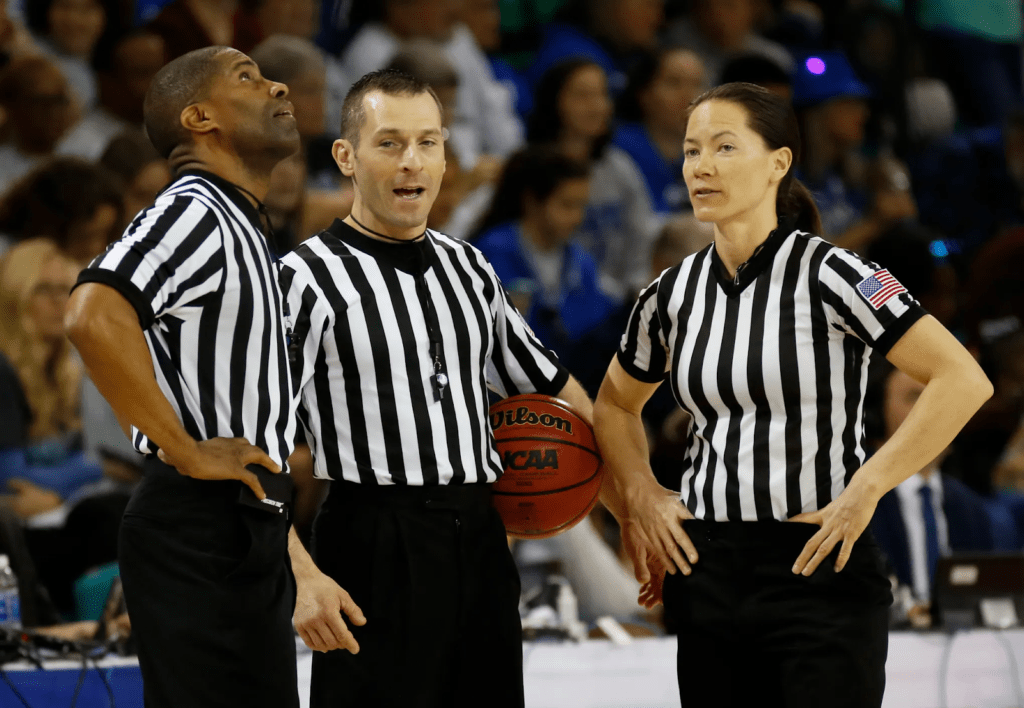Basketball relies heavily on officials to preserve the game’s rules and fair play. Their choices can greatly impact a game’s outcome. A single choice can decide if a team wins or loses. To know more about basketball skills, officials, and their functions, keep on reading with us!
What are officials in basketball?

People see basketball as one of the hardest games to officiate. This is because of the fast pace of play and the complexity of the rules. The laws require case-specific interpretations and immediate decisions. So, basketball officials police the rules and keep the game in order. Referees use hand and arm signals in a sequence to ensure that everyone is informed of a judgment.
You may be interested in:
The types of basketball officials
The following types divide basketball officials:
- The referee
- A time-keeper
- A scorer
- A recorder
History of Basketball Officials

The NBA introduced the three-pointer in 1979. It also added a three-man officiating system for the 1978-79 season. But, the league returned to two referees the next season. The NBA has employed the three-official system since its reappearance for the 1988-89 season.
American high school and college basketball officials typically wear black and white striped shirts. The shirts have black side panels. They also wear black slacks and black shoes. Some state high school associations let officials wear gray shirts with black pinstripes. They wear these instead of black and white striped shirts.
Duties of basketball officials
We categorized the duties of the officials according to their types.
Chief referee

He is the senior official and his duties are:
- He inspects and approves all equipment
- He tosses the ball at the center to start the play.
- He decides whether a goal shall count in case of disagreement.
- He decides on issues on which the timekeeper and scorer disagree.
- He examines and approves the scores at the end of each half, he also makes decisions on any points not covered by the rules.
Referees

- The duties of the two referees combined and include the following:
- They conduct the game according to the rules.
- They allow substitutes to come onto the court.
- They order time-out and decide whether they become dead.
- They count seconds when a player must play, pass the ball, or be short.
Time-keeper

- His tasks include accurately tracking playing time.
- Record both the playtime and the time for stoppages as specified in the rule.
- To stop the clock in the following situations:
- At the end of every quarter.
- After the end of each half
- When an official signaled foul
- Throw-in or breach of the regulation.
- When the timer sounds the 24-second signal
- When an official signals a time-out
Scorekeeper

- His tasks include recording each player’s point totals.
- He logs personal and technical fouls against players.
- He signals when the player has five fouls.
- He keeps track of each team’s timeouts and informs the teams and referees on how many they have had.
Recorder
- He is in charge of recording each team’s scores on the large board.
Salaries of basketball officials
As of March 26, 2024, the average Basketball Official pay in the United States is $38,469, with a normal wage range of $31,675 to $46,868. Salaries can vary a lot. They depend on things like schooling, certifications, extra talents, and years of experience.
Highest-paid NBA officials ($550,000)
In the Basketball officials list, these are some highly paid referees:
- Ken Mauer(starting his 35th season)
- Tom Washington(starting his 30th season)
- Scott Foster is (starting his 29th season)
- Tony Brothers(starting his 29th season)
- Sean Corbin(starting his 26th season)
- James Capers(starting his 26th season)
- Rodney Mott(starting his 23rd season)
- Marc Davis(starting his 23rd season)
- Pat Fraher(starting his 20th season)
- Eric Lewis(starting his 17th season)
Difficulties for basketball officials
If you already had any research on basketball officiating information, you must have an idea of the toughness of the official’s job. Many fans perceive basketball as one of the most difficult sports to officiate. The speed of play and the officials’ nearness to the action give basketball referees only a few seconds to spot an infringement. The “charge/block” call and the attempt to shoot foul/block are particularly difficult. Officials frequently rely on instant replay to review plays. A coach has just recently been able to argue an official’s call or one that they missed, but this is only for a limited time.
Many think basketball is a non-contact sport. But, officials often allow some accidental contact. An official must always know what is happening around the ball. They must also know the roughness of play around the court. The roughness adds to the official’s duty.
The proximity to crowds complicates an official’s task even more. Unlike football or baseball, the spectators, coaches, and other bench players are almost always within a few feet of the official. To combat this, officials can evict a fan from the arena.
Top 5 Best NBA Referees of All Time
- Mendy Rudolph (1953-75)
- Joey Crawford (1977-2016)
- Dick Bavetta (1975-2014)
- Earl Strom (1957-1990)
- Darrell Garretson (1967-1994)
What are the ethical standards for officiating officials?
Officials must uphold the core principles of officiating. These principles include history, integrity, neutrality, respect, sensitivity, professionalism, discretion, and tact.
Who is the longest-serving NBA referee?
Dick Bavetta, the longest-serving NBA referee in history, worked for the league for 39 seasons from 1975 to 2014.
Who is the highest-paid NBA referee?
In 2023, James Capers is expected to earn $550,000 per year plus $9,000 in playoff fees, making him the highest-paid NBA referee.
Conclusion
So, we discussed all about Basketball Officiating Information. Basketball officials play a crucial role in ensuring that teams play fairly and adhere to the rules. They are skilled specialists. They must meet strict criteria and know the game well.